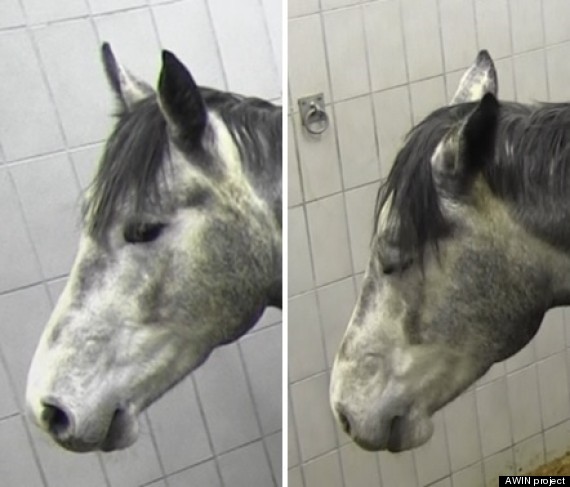What does it feel like to have your testicles sliced off? Not so good. Castrated horses would probably complain if they could, but neighs and whinnies go only so far as tools of communication.
Lucky for these animals, European researchers associated with the Animal Welfare Indicators project have now successfully tested a "horse grimace scale" (HGS) that lets owners gauge the discomfort of newly minted geldings--so that appropriate levels of pain-killing medication can be administered.

The horse on the left is in no pain. The horse on the right is showing obvious signs of pain, including flattened ears.
The scale is welcome news for more colts than you might think. Castration -- generally done to make animals easier to manage--is a common practice around the world, with an estimated 240,000 horses castrated each year in Europe alone. And as one of the researchers, University of Milan professor of veterinary science Dr. Emanuela Dalla Costa, told The Huffington Post in an email, only 37 percent of the animals get postoperative painkillers.
Ow.
There are other ways to gauge postoperative pain in horses, according to Dalla Costa, including the so-called Composite Pain Scale. But she said that using this scale--which requires observations of horses' sweating, pawing the ground, and other behaviors--can be tricky for people without expertise in veterinary care.
In contrast, "the HGS exploits the natural tendency of humans to focus on [the animal's] head and face when assessing pain," Dalla Costa said. "Therefore, we think that the HGS method could represent a reliable and feasible method to help owners identify pain in their horses."
The scale is based upon observations of six signs of pain in horses: stiffly backward ears, orbital (eye) tightening, tension above the eye area, strained chewing muscles, strained mouth and pronounced chin, and strained nostrils/flattening of the profile. Its reliability was confirmed in a study involving 40 healthy stallions of between 1 and 5 years of age, all of which were surgically castrated under general anesthesia.
Some of the horses in the study got a painkiller only before surgery, while others got a painkiller before and afterward. These animals were compared to a control group of six horses that underwent general anesthesia for less painful procedures. The animals were observed during the recovery period by veterinary surgeons and other individuals with significant experience in gauging horses' postoperative pain.
What did the study show? As the researchers explained in the abstract of their study, the HGS "potentially offers an effective and reliable method of assessing pain following routine castration in horses."
Could the HGS also prove useful with other painful conditions? Perhaps. But further studies should be conducted to verify that, according to Dr. Dalla Costa.
The study was published online March 19 in the journal PLOS Medicine.

